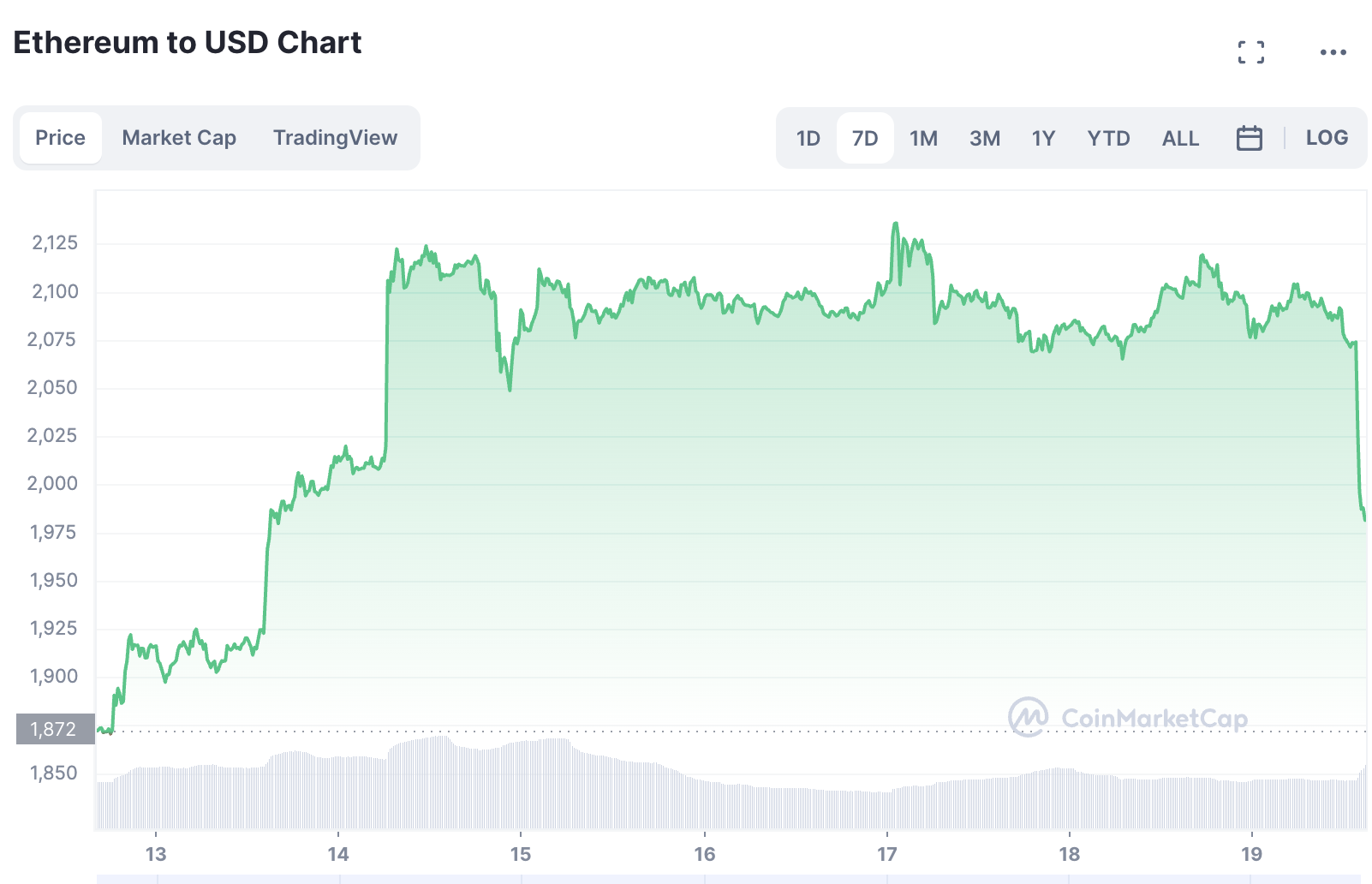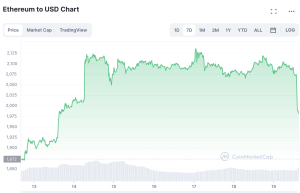Join Our Telegram channel to stay up to date on breaking news coverage
Crypto exchanges received a net inflow of 179,500 ether (ETH) in just four days since the Shanghai upgrade, equivalent to approximately $375 million. Traders deposited 1,101,079 ETH to exchanges between April 13 and April 16 and only removed 921,579 tokens, marking the largest four-day net inflow in a month.
Investors are usually about to sell their tokens when they move them to exchanges, and this could potentially result in a decrease in price.
On April 12, Ethereum completed the Shanghai upgrade, enabling withdrawals from its proof-of-stake blockchain for the first time. The blockchain currently holds around 18 million ETH in staking contracts, which amounts to roughly $36 billion.
Before the upgrade, some crypto experts were worried that millions of unlocked ETH would flood the market, causing the price of the second-largest cryptocurrency to crash. Others, however, believed that the impact would be minimal or that the price would even go up.
The good news is that the upgrade went smoothly, and it had a positive impact on ETH’s price. In fact, the price surged to over $2,100 the next day, which was the highest it had been since May 2022. During that 24-hour period, ETH even outperformed BTC.
ETH is currently trading at around $2,096, with an increase of about 2% in the last 24 hours. From the looks of it, some traders decided to sell their ETH during the price surge that occurred after the Shanghai upgrade. The sellers have outcompeted the buyers for the ETH-USD trading pair by $28 million on Coinbase since the upgrade.
Significance of the Upgrade for Ethereum’s Network
Since the Shanghai upgrade, there has been a surge in the amount of ETH being used and in transaction fees. This increase in activity can be attributed in part to the growth of DeFi and NFTs on the Ethereum network. As a result, the average transaction fee on the network has gone up to over $50, with some transactions costing as much as $200.
While this high fee might deter some users, it’s actually a good thing because it shows that there is a strong demand for the network’s services. However, it also highlights the need for scalability solutions like Ethereum 2.0.
The Shanghai upgrade is a crucial step towards the much-anticipated Ethereum 2.0, which is set to improve the network’s scalability, security, and sustainability. One of the most significant changes is that Ethereum 2.0 will replace the current proof-of-work consensus mechanism with proof-of-stake, which is more energy-efficient and less prone to centralization.
Although the transition is expected to take several years, it’s a huge step towards making the Ethereum network more reliable and sustainable for the long term.
Ethereum’s Successful Network Upgrade to Boost Investor Confidence
The upgrade is a crucial step towards the network’s shift from a proof-of-work (PoW) to a more energy-efficient proof-of-stake (PoS) consensus mechanism. While some experts predicted that the price of ETH would drop due to selling pressure, others believed that there would be little impact or even a price increase.
A successful Ethereum network upgrade will boost investor confidence in locking in ETH, leading to reduced supply and increased demand. Hence, the price is not expected to drop significantly.
Institutional investors are still likely to remain cautious and refrain from staking for now. The performance of ETH around the Shanghai fork will depend more on investors’ risk appetite than technical analysis.
Bitcoin (BTC) saw a 3.54% rise on Thursday, reaching around $30,315. Despite facing regulatory challenges, institutional adoption of BTC is expected to accelerate. Other digital assets have also been performing well, with liquid staking derivatives’ token prices, such as Lido DAO’s LDO, Rocket Pool’s RPL, and Stader’s S.D., all experiencing significant increases in value. ICP, the Internet Computer token, has risen 15% over the last 24 hours, reaching about $7.12.
The S&P 500 and the tech-heavy Nasdaq have also been in the green over the last 24 hours. The Dow Jones Industrial Average (DJIA) is struggling to repel the red, whereas Gold has continued to stay above $2000, as investors prefer assets that retain their value.
According to the CME FedWatch, 66% of traders predict that the U.S. The Federal Reserve will raise interest rates by 25 basis points at the next Federal Open Market Committee (FOMC) meeting on May 3.
What Is The Shanghai Upgrade?
On April 14, 2022, the Ethereum community celebrated a significant achievement with the completion of the Shanghai hard fork. This marks the transition to a full proof-of-stake network, which means that users can now withdraw their staked ether and redeem their accrued rewards – a crucial feature of the new system.
Vitalik Buterin, Ethereum’s co-founder, stated during a live stream hosted by Ethereum Cat Herders that the hardest and fastest parts of the Ethereum protocol’s transition were over, but scaling the blockchain remains the next challenge. He cautioned that if scaling is not addressed before the next bull run, users could face high transaction fees of up to $500.
Many market analysts were curious about the effects of the Shanghai hard fork on market sentiment, and some wondered if it would lead to a crash.
However, the introduction of validators to maintain the blockchain has significantly reduced Ethereum’s energy consumption by 99%, which not only makes the network more secure but also more decentralized.
Validators are required to stake a minimum of 32 ETH to secure the Ethereum network and participate in block validation.
There’s also an alternative option called liquid staking that lets users contribute any amount of ETH, which is then staked and managed by third-party providers on their behalf. Lido is the biggest provider in this space, and it manages around 23% of all ETH staked.
Now that the Shanghai hard fork is complete, users have the option to make partial or full withdrawals. While that’s the case, it’s important to note that Ethereum can only process 16 partial withdrawal requests in a single slot, which happens every 12 seconds.
Related Articles
Join Our Telegram channel to stay up to date on breaking news coverage


